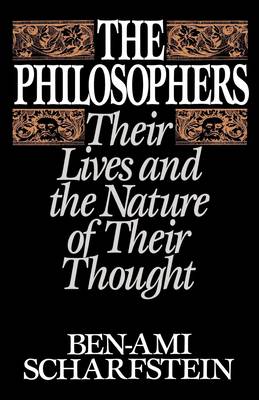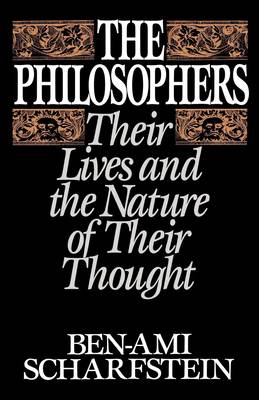
Door een staking bij bpost kan je online bestelling op dit moment iets langer onderweg zijn dan voorzien. Dringend iets nodig? Onze winkels ontvangen jou met open armen!
- Afhalen na 1 uur in een winkel met voorraad
- Gratis thuislevering in België vanaf € 30
- Ruim aanbod met 7 miljoen producten
Door een staking bij bpost kan je online bestelling op dit moment iets langer onderweg zijn dan voorzien. Dringend iets nodig? Onze winkels ontvangen jou met open armen!
- Afhalen na 1 uur in een winkel met voorraad
- Gratis thuislevering in België vanaf € 30
- Ruim aanbod met 7 miljoen producten
Zoeken
€ 40,45
+ 80 punten
Omschrijving
This highly readable volume offers a broad introduction to modern philosophy and philosophers. Ben-Ami Scharfstein contends that personal experience, especially that of childhood, affects philosophers' sense of reality and hence the content of their philosophies. He bases his argument on biographical studies of twenty great philosophers, beginning with Descartes and ending with Wittgenstein and Sartre. Taken together, these studies provide the beginnings of a psychological history of the philosophy of the period.
Scharfstein first focuses on the philosophers' efforts to arrive at the objective truth and to persuade themselves and others of its existence. He then explores truth and relevance, both proposing the broadening of the traditional philosophical conception of relevance and considering philosophers' need to create something that belongs to and transcends them as individuals.
Scharfstein first focuses on the philosophers' efforts to arrive at the objective truth and to persuade themselves and others of its existence. He then explores truth and relevance, both proposing the broadening of the traditional philosophical conception of relevance and considering philosophers' need to create something that belongs to and transcends them as individuals.
Specificaties
Betrokkenen
- Auteur(s):
- Uitgeverij:
Inhoud
- Aantal bladzijden:
- 496
- Taal:
- Engels
Eigenschappen
- Productcode (EAN):
- 9780195059274
- Verschijningsdatum:
- 20/04/1989
- Uitvoering:
- Paperback
- Formaat:
- Trade paperback (VS)
- Afmetingen:
- 140 mm x 216 mm
- Gewicht:
- 630 g

Alleen bij Standaard Boekhandel
+ 80 punten op je klantenkaart van Standaard Boekhandel
Beoordelingen
We publiceren alleen reviews die voldoen aan de voorwaarden voor reviews. Bekijk onze voorwaarden voor reviews.











